Episode 261: Ad Sequences, Adding to Audiences using Workflow Actions and breaking down big goals
Welcome to HubShots Episode 261: Ad Sequences, Adding to Audiences using Workflow Actions and breaking down big goals This edition we dive into:
If you're new to HubSpot, we guide you on where to start, how to do it right, and train you to make the most of the platform.
Review your HubSpot portal to uncover issues, spot growth opportunities, and ensure you're maximising its potential.
Unlock business growth with automation and attribution. Implement best practices and execute marketing campaigns.
HubSpot On-Demand
HubSpot Training
HubSpot Websites
HubSpot Campaigns
Virtual HubSpot Manager
23 min read
 Craig Bailey
5 March 2021 2:40:07 PM
Craig Bailey
5 March 2021 2:40:07 PM
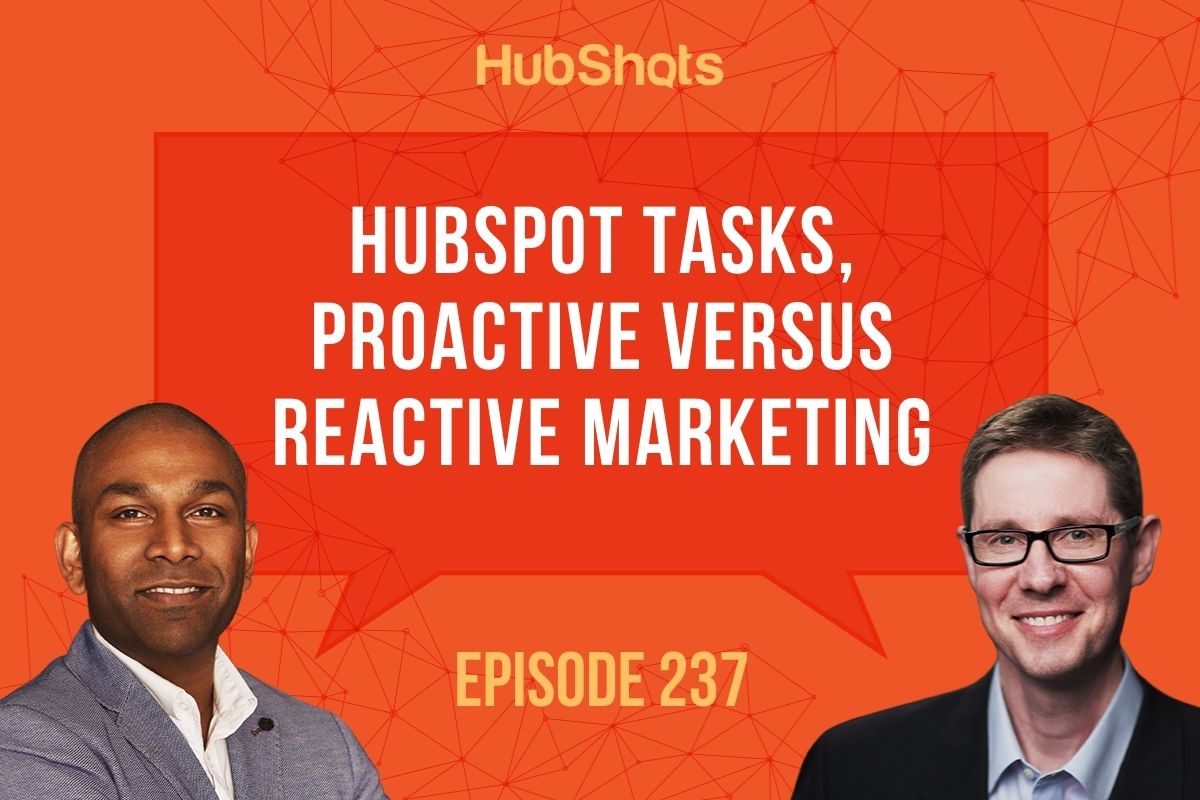
This edition we dive into:
You can listen to this episode of the show here.
Did a colleague forward this episode to you? Sign up here to get yours every Friday.
Please forward this on to your work colleagues.
Recorded: Monday 01 March 2021 | Published: Friday 05 March 2021
How can we benefit from the Facebook News debacle last week?
As you will have seen, Facebook and the Australian Government have come to an agreement after the legislation had a few amendments added. Those ‘amendments’ were basically a change so that the legislation doesn’t apply to Facebook! Can’t make this stuff up.
Here’s Facebook’s summary of what happened. Whilst mostly accurate, it’s smug and non-apologetic for any disruptions, and does nothing to soften the Facebook perception. That’s their right I guess, but still - if people were hating on Facebook before this, they aint going to be stopping any time soon...
That said, I’m still (I hate to say) on Facebook’s side on this whole situation. The Government (and we’ll leave Murdoch out of it at this point) had a chance to work with ‘big tech’ and totally botched it. We’ll be the laughing stock of other countries for years to come. NiemenLab captured it pretty well (although it is a bit overly dramatic).
So how can we look at this positively?
The focus, as marketers, is to reflect on what this has exposed in our marketing strategies, and how we can improve.
Last week we noted that this was a timely reminder not to build your house on rented land. It’s worth reiterating this week. Where are you exposed? What can you do proactively now to ensure your exposure to things like this are minimised in future?
Hopefully you’ve signed up for our weekly show notes email - if not, please sign up here.
In addition to our weekly email we’re adding another channel - it’s our new HubShots Show Notes Twitter Account:
This is separate from our long time HubShots Twitter account:
In our show notes Twitter account, we share all the links that we read and research through the week that make it into the show notes. We also hashtag them with the episode number eg here’s all the show notes links for this episode (237):
https://twitter.com/search?q=(237)%20(from%3Ashotshub)
BTW we aren’t mentioning this show notes Twitter account anywhere else yet - currently it has zero followers - would love you to follow it after listening to this - so we can see how many people find it useful. Follow us and we’ll follow you back (lol, old school encouragement).
Here’s a few quick items of interest we noticed:
HubSpot has announced Marketing Tasks.
You can find it under Marketing > Planning and Strategy > Campaigns
What’s strange about this, is that when I check it out, I saw there was a task from back in 2015:

I’m not quite sure what part of this is new - perhaps it’s just the new interface. In any case, it’s a nice feature to take advantage of. Tasks have really been getting focus lately on the Sales side, so it makes sense that they are rolling that experience into the Marketing side.
Filters on Marketing Tasks are much more basic and there’s no equivalent of adding Queues.
Tasks now have permissions settings enabled. This brings Tasks inline with Deals and Tickets in terms of being able to manage who can see which tasks.
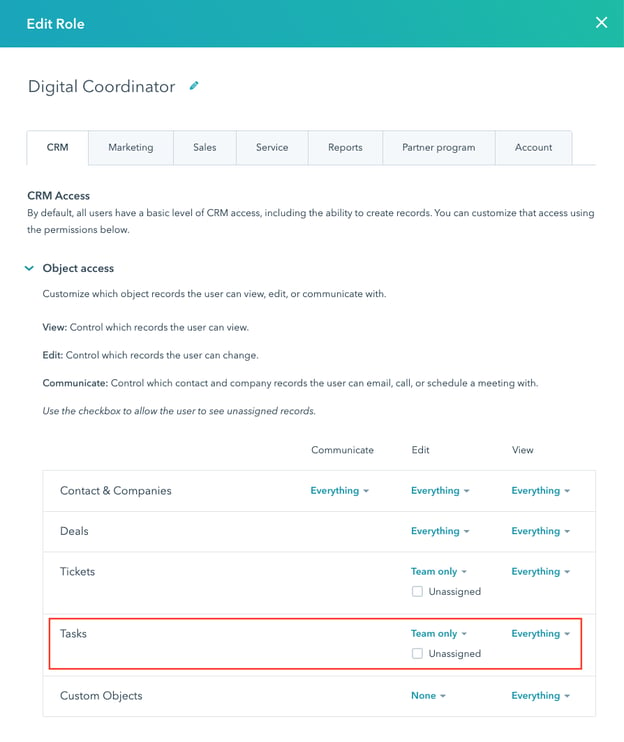
Another way to think of this is that it’s the next item to be added to allow partitioning.
This is a good thing.
All we need now is for the same to be added to Social accounts, and we’ll be all set!
Our teams have been doing this certification. It is new! You will learn everything you need to create a customer-centric advertising strategy, including journey-based advertising, bidding and targeting strategies, paid search, social media advertising, programmatic, reporting, and more.
Previously in Workflows there were separate actions for creating Deals, Contacts, Companies etc.
They have been grouped under the Create Record action now:

I had a confusing moment earlier when I thought I had lost some functionality… #needcoffee
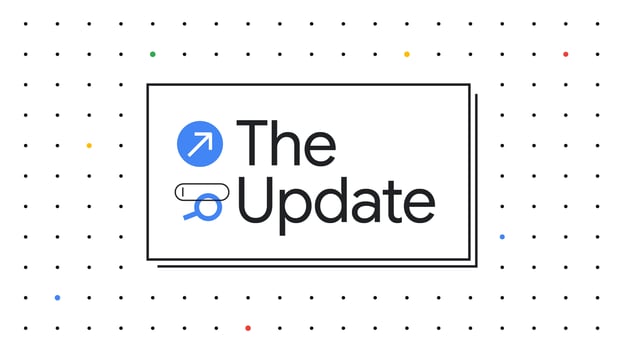
Google leaders and industry experts share insights that businesses need to know now. What are the latest trends? How are companies adapting?
We all know we can be proactive versus reactive with our physical health - it’s the difference between going to the gym to get fitter versus going to the doctor to diagnose an ailment.
Same for mental health - we can be proactive by seeing a psychologist or therapist, or reactive when facing times of hardship.
Interestingly, physical health treatment (both proactive and reactive) is seen as a good thing, whereas mental health treatment often has a stigma attached.
Nothing highlights this more than having an insurance company give you a health insurance benefit if you visit a gym, but a health insurance exception if you visit a psychologist. But I digress...
I like to consider how these life approaches have equivalents in the marketing space.
I think we can fall into the trap of attaching a stigma and penalty to some marketing activities.
We often praise the reactive activities of marketing teams eg responding to a crisis, change in marketing landscape (Eg Google algorithm update, Facebook News withdrawal) and some proactive marketing efforts that chase shiny objects (eg a new channel such as TikTok or Clubhouse).
But what about the proactive efforts that aren’t glamorous - the investigation into areas that have failed in the past, or don’t seem to be working. Often these are avoided because they:
I’ve been guilty of this myself - I’ve often told customers we ‘test and measure’ and then double-down on what worked and pause what didn't’.
But I’m re-thinking this approach. There’s value in the hard work of analysing why things didn’t work. Understanding the ‘why’ behind the ‘what’. Sure, there’s budgets and timeframes to be managed, so perhaps this approach isn’t ideal for all situations - we’ll start with analysing our own agency failures before we consume customer time on theirs.
Here’s the takeaway: Are there some unsexy areas of your marketing failures that could reveal hidden gold if you got to the bottom of them?
Let me know.
Via the HubSpot product updates blog.
This time a year ago HubSpot was releasing an update to Sequences which they referred to as Advanced Sequences. As well as a new interface it added the ability to bulk enroll up to 50 contacts at a time (and increased daily send limits). They also added a Sender Score report to encourage ‘responsible sending’ lol.
There’s an old maxim in marketing that the longer and more in-depth a piece of content is, the more likely that:
Yes, people love to share long, high quality articles on the socials, even though they haven’t read them - perhaps it’s a form of virtue signalling, or perhaps it just feels safer when filling the social sharing queue for the week.
In any case - full disclosure - I haven’t read either of the resources below yet, but I trust the sources, and I plan to read them (my backlog is quite full)
Moz have released a massive guide to Local SEO - you can get started here.
And Tim at ahrefs has written a monster post on link building - I love the images especially!
Here’s a great quoted price for the HubSpot Growth Starter Suite - use the Bundle Builder (thanks to Sera at HubSpot for showing me this).
I haven’t actually done this course yet, but it’s on my backlog - a free intro course from Google on Machine Learning.
Connect with HubShots here:
Connect with Ian Jacob on LinkedIn and Craig Bailey on LinkedIn
HubShots, the podcast for marketing managers and sales professionals who use HubSpot, hosted by Ian Jacob from Search & Be Found and Craig Bailey from XEN Systems.
HubShots is produced by Christopher Mottram from Podcastily.
Please share this with colleagues - it helps us improve and reach more marketers.
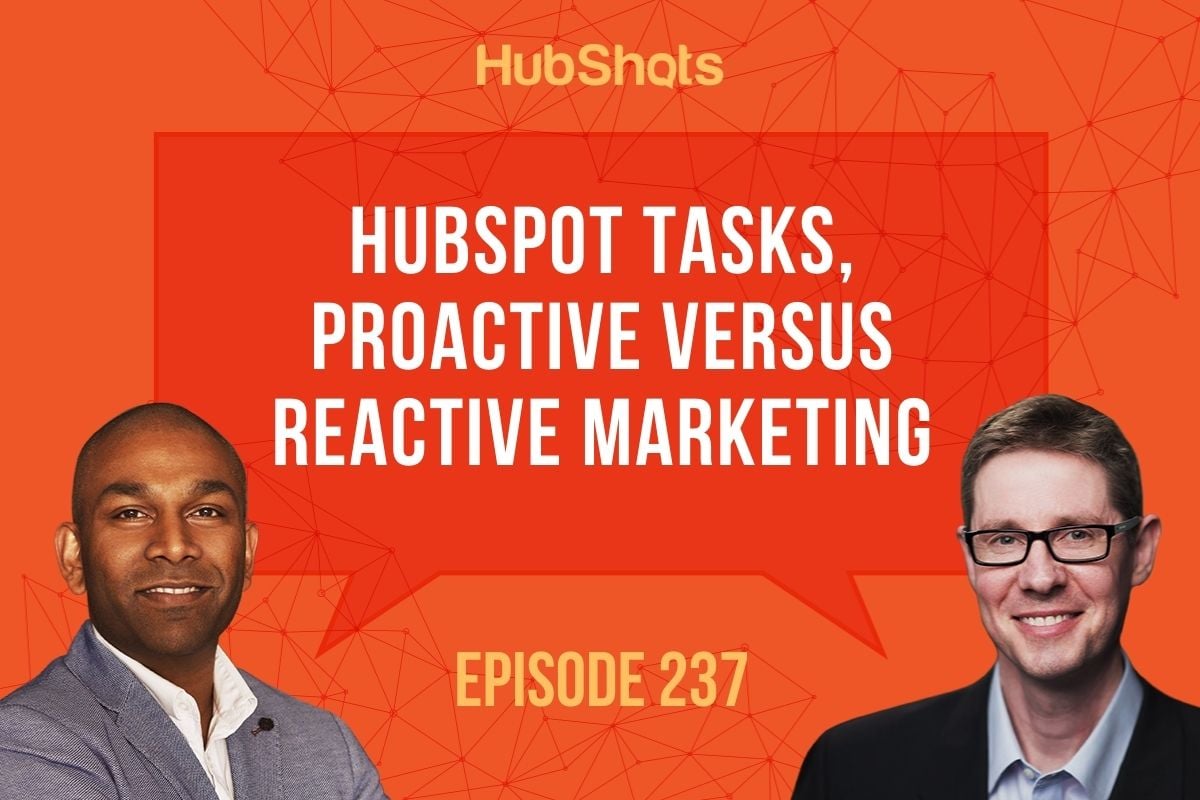
- Hi, everyone. Welcome to HubShots, episode 237. In this episode, we talk about Facebook versus Australia follow up. HubSpot marketing tasks, HubSpot task permissions, and proactive versus reactive marketing. You're listening to Asia Pacific's number one HubSpot focus podcast where we discuss HubSpot tips, tricks and strategies for growing your service, sales and marketing results. My name is Ian Jacob from Search and Be Found, and with me is Craig Bailey from Xen Systems. How are you, Craig?
- I'm well Ian. Good to be back for another week and back in the news.
- That's right. And tell us more. What has happened, Craig?
- All right. So since we recorded last week, and by the way I know listeners by the time you listen to this, it's yet almost another week after we've recorded. Cause we're recording on Monday the 1st of March. By the way, happy new month. Ian, a start of a new month and a new season.
- That's right a new season Craig. Autumn for us in Australia.
- That's right. And so, by the time you're listening to this listeners, it's Friday. And so this will be old news by then. But I thought it was important to follow up the Facebook news debacle that happened last week and the week before. And since our last episode, Australia and Facebook have come to an agreement. And that was after, and I can't make you can't make this stuff up Ian but after Facebook requested some amendments to the legislation, and the Australian government put in some amendments. And you know what the amendments were? They are effectively that the legislation didn't apply to Facebook. They're not serious. It's just ridiculous. But of course, then both sides got to save face. And the Austrarian government looks like, oh look what we've, you know, broke it. And it's just like, anyway, it's ridiculous. I've got some good links in the show notes about good summaries from Leiman lab and other places. I don't think anyone's really come out looking good from this. But what I wanna do, is turn this into a teachable moment as people would say. And looking at, what can we learn from this? And in particular for marketing managers, what does this mean we should be changing and proactively looking at fixing? So how can we look at it this positively? And I think, if we look back to what we chat about last week. We're saying don't build your house on rented land. That was the biggest message. Hopefully, for some marketing managers this has really exposed them. They've come like, oh, we're actually exposed by this. I think the key takeaway from this whole situation, is marketing managers look at their marketing strategy for the year and highlight all the risk items. What are the potential areas where we're exposed? Okay Facebook, we're along on Facebook for organic or paid. You know, you can lose your Facebook account or quite often they get disabled for no good reason. Finally, you get through to someone from support-
- That's right.
- Three weeks later, oh, sorry. A mistake they re enable it. That's an exposure point. Google algorithm changes. All these different things. So have a look through your strategy and it's probably not only strategy. It's really the technical channels.
- Yep.
- Quickly go through them and do a risk assessment. I think that's the takeaway from this. And then, you can proactively look at minimizing your risk for the remainder of the year.
- That's excellent Craig. Now talking about minimizing our risk. There are more ways to get HubSpot show now, Craig.
- That's right. So of course you should go to hubspot.com/subscribe and sign up to get our in-depth show notes which also includes bonus links we don't get to go through on the show. By the way, send it to your friends. We'd love you to share this around. In fact, this is one of my goals this year. I really wanna grow a email list.
- That's right.
- Ian, but the other thing that we've done is we've created a HubSpot show notes Twitter account. So we've had the HubSpot Twitter account for ages since the start. Which just really announces when new episodes are available. So we try to keep that very clean. Way back when we did post a lot of stuff there but we've tried to keep it really clean now. Created a new account which is just for all the show notes. So basically anything that we link to in the show. We post on Twitter almost just as a kind of a feed of anything that's in the show notes. So if you're listening to this, and you're not subscribed or you don't wanna subscribe to the email, that's fine. But you still want a reference, oh, what were those links? I don't wanna go to the blog post and find it. Just go to that Twitter account. And it's twitter.com/shotshub, not twitter.com/hubshot which is our main account. It's twitter.com/shotshub. Similarly, they just reverse it around.
- That's right.
- That's why that's easy to remember. Go there, by the way, we have zero followers. As of the time of recording. And the only place I'm gonna announce this is on the show. So listeners, I'd love to love you to go and follow. I'd really like to see how many listeners follow up.
- So, you know, it's interesting? You say, there is zero. I'm looking at the account right now, Craig, we have three
- No, no, that's three accounts we're following.
- Oh, we're following.
- Cause I'm following HubSpot.
- Apologies.
- Yes.
- I got excited. You're right it's zero followers.
- Zero followers. I even, I'm not following it. It's zero followers. Right? Cause I just wanna see how many of our listeners will go and follow it. Please do and we'll follow you back. By the way old school encouraging how they used to say, 'oh, follow me, I'll follow you back'. Follow us listeners will follow you back on the HubShot. And if you done it and if you got something good will retweet it because it's probably an oppressor.
- Exactly, exactly. And now listeners we've got a few quick shots of the week and there is the usual proctor up day video for February that has just landed. So I encourage you to look at that. It's a good overview of what's happening in HubSpot. And the second one is HubSpot social Chrome extension. And it's surprisingly good Craig
- I've had this on and off, but I'm using it again now. That's how I'm doing the HubSpot show notes
- It is better that it used to be. And so after I saw you put this in, I actually had to re-install it on Chrome, but yeah, it was fantastic. It was a good experience. All right onto our HubSpot marketing feature the week, Craig and we're talking about Marketing Tasks.
- Apparently this is new in.
- I know, I find that hard to believe. Maybe it looks new Craig.
- New interface? But they're announcing it as new. I know Marketing Tasks? Anyway, by the way, in terms of announcing something new they've managed to hide it well. They have have a sense on the marketing, the marketing menu, then you go planning and strategy, then you go to the campaigns tool, so you get to marketing tasks. By the way, the very basic. originally when the announcers it's a probable sales tasks. They've really been revamping that. You know, it's really great. And all the kind of views and all this kind of thing. But then Marketing Tasks I know more than what is this? Like the poor forgotten child?
- Child
- That, you know, anyway, maybe they got big plans for it. I guess it's got the new interface.
- It does.
- So that's good. It is good. And you know, but it's not new.
- Yeah we use to have the tasks in the calendar didn't we?
- Yeah.
- Yeah, yeah. So I don't know why this is new. Maybe it's-
- Maybe it's bringing into line with all the other tasks that we're seeing.
- It's the new experience Craig. Yeah Marketing tasks. Or maybe, maybe they either used to have just tasks and then they created sales tasks and that's of course everyone talks about tasks and things in the sales mindset.
- Exactly.
- Now Marketing task is new. What's old is new again Ian?
- That's right Craig. All right, our HubSpot sales feature of the week and it's to do with Task Permissions. And this is gonna bring everything into line with deals and tickets in terms of being able to manage who can see which tasks and this is in the role settings for people.
- Well, it actually can be users as well, users or roles. I've got a screenshot in a role because we set up roles in our portal.
- I think from the backgrounds that we come from we're used to talking about roles and users. When I talk to people often they don't understand what a role is and they understand what a user is. So let's just take a step back and explain why we would want to set up roles and then set up users within roles.
- Yeah right. Okay, do you want me to do that?
- Yeah, let's do that.
- Okay so if you think about a user, you can go to an individual user. And so you've got someone new on your team, individual you go to their user account you set their specific permissions. Now of course they're new. You don't want to give them access to everything. So you just wanna cut down version or they can view this, view this. Or they have full access to that, but only view that. And it's kind of like, oh great I'll set that all that out. Oh gee I wish I could just copy that set of permissions to someone else. Create a template of it or something like that. Oh, I know that person. Why don't we say they're new? Oh, that's their role, new person role. That's what roles are. So then there's a new tab on the settings where you can just go for a role, create all those permissions. So it's like a template of permissions. And then you go to the user instead of going through and manually setting all the permissions for that user you just set their role and they inherit all those permissions. Very handy. We have about five in our portal.
- That's right, so let's say generally, when we look at roles we might have a role within marketing. So you've got like a digital coordinator role. You might have a couple of roles within sales, possibly depending on what sales, how they're structured. You might also have an admin role. So people that are looking after service and support. So these are probably good places to start. And anybody else that has access to the system and probably has site-wide access but we have super admin access that people are aware of. But it's a really good place to start to set this up because as you grow, you will make sure that you're not you're giving access appropriately and not inappropriately.
- Yeah, and we actually also have a role called basically view only or actually I've just forgotten what we call it but it's the minimal permissions. Cause if someone leaves our company-
- Correct.
- we don't delete them out of the portal. We actually keep them there. But we set all their permissions effectively to zero.
- Yes.
- The reason we do that is because then when you see some assets you don't see a workflow or who it was created by or this email. Instead of seeing ah user no longer exists or whatever you still see their name, but they've got no permissions. If they logged in, they couldn't actually do anything. So that's a nice little role. That's almost part of our exit checklist for people when they leave. Yeah.
- So I do wanna bring up something else. Craig is just as we have a way to have these roles for onboarding people, of boarding is also really important. And then what you do with those people or the those users once they've off boarded. So making sure you've got your team set up correctly and even people that own contacts. And what do you do with them? How do you reassign them? Have a process in place because you can get caught out. Say for example, you often send emails from a contact owner and those contacts have left. If you don't know that or understand that you could be sending emails from people that are not a part of the business any longer.
- That's a very good point yes.
- So this is a really important and that's why we are talking about it. All right onto our HubSpot Academy course of the week, Craig and this is a Digital Advertising. So it's called Digital Advertising. But when you look into it first it says 'digital advertising one oh one how to develop a winning online advertising strategy.' And this is a new course in the Academy and this listeners, even if you are not a part of HubSpot, you can still do this. It's a, it's a free certification and you'll learn everything you need to create customer centric advertising strategy including journey based advertising, very important. Bidding and targeting strategies, paid search social media advertising, programmatic reporting and more. So it does cover a very wide breadth of topics but very important in today's landscape. All right onto our HubSpot Gotcha of the week Craig.
- You know, how that has sort of always improving and consolidating and simplifying things?
- That's right.
- So in workflows. You add an action and workflows and used to be able to choose our create deal create ticket, create whatever.
- That's right.
- They consolidate that. That's now called the Create Recode Action. Anyway, just a little gotcha because I was like, ah, I can't create a deal from workflow. What's going on? I don't know if I lost functionality what's happening to my life? You know, I had this mini little-
- Oh, your mini meltdown.
- little moment of panic. I was like what's going on? My brain was in you know, it does not compute what's going on Anyway, create record. It could have been there for ages. I haven't realized they in, but yeah.
- And I think this is why this is happening is more and more you're able to execute and do things in a workflow. And so we're finding them coming up on the menu. So this menu is getting quite large dah. So I think they're now at a stage where they're trying to see, well how can we minimize this or make it easy to take people through the process of creating the record and doing it in a meaningful way where we don't lose things.
- I think this is right, that they are streamlining cause they've got big plans for all these workflow actions. You and I are part of the beta we can't mention some of them. But some of the things they've got coming in the workflows.
- Exactly. Yep.
- Fantastic. Very exciting.
- That's right. All right, on to our marketing tip of the week. and this is something relatively new from Google. It's a video series with marketing experts Craig and we were watching one with Gordon Ramsay, were we? And so what they really say that they say it's Google leaders and industry experts 'share insights that businesses need to know now.' That's how it was phrased. And what are the latest trends and how are companies adapting? And so there's quite a few videos there. So if you wanna learn more and just broaden your horizon it's a great place to start.
- So I'll just make a comment on this. Cause I started out, I saw like, ah, Gordon Ramsay what am I gonna learn from him about marketing? Right? This is just, yeah. I went in with low expectations. What does he talk about? YouTube, of course, cooking and YouTube the way he's using YouTube. And I was like, oh yeah, this was really good.
- And then we started talking about Fryer Pans, do we Craig?
- These are the big topics.
- Fryer pans and why handles on fryer pans? People use have to, oh they're hot in essence but not cast iron fryer pans.
- Cast iron that's it.
- that's right.
- I was trying to remember what the good fryer pan that cast iron. I'm gonna say, I learned that today.
- That's right. And I gave Craig an explanation as to why they need you need something to hold on when they're hot. All right, on to insight of the week Craig proactive versus reactive marketing health.
- All right, I've been thinking about this topic for the last couple of weeks, and you've been helping me come through with those thoughts but a proactive versus reactive marketing. I'll just take a little aside and talk about, you know, in real life. As I say, if you think about any physical health you can have a proactive and reactive. So proactive, you go to the gym or reactive, I've got a pain I'll go to the doctor. And that's great physical health. By the way, mental health, similar you can be proactive about your mental health.
- Yes.
- Or reactive you know, if you've got underlying conditions, interestingly though mental health often has stigma attached to it. Even if you're proactive.
- Yes.
- Versus physical health, which is praised. So, and we know this in business as well right? You get health insurance, you'd say I've got gym membership that give you a discount on your health.
- Yeah.
- You say, Oh, I'm actually proactively going and seeing a psychologist oh that's a no-no especially insurance. So it's kind of weird that there's no encouragement to proactively improve mental health like there is physical health. But anyway that's a digression. What were you gonna say about that?
- No you just reminded me, my wife was telling me about people being able to have a actually have a mental health day, I think.
- Right?
- Yeah.
- Yeah so it is being normalized-
- It is being yes.
- a little but nowhere near enough. And I know, well, yeah.
- That's all right. So tell us about marketing Craig.
- But anyway, getting back to proactive versus reactive. I feel, and this is something I'm still thinking through. So listeners I'd love your feedback on this. I think just like we can attach stigma to some health issues, we can attach stigma to some marketing activities that we do. And there are things that kind of get praised you know, bright, shiny new objects and a new channel comes out oh Tiktok or Clubhouse or whatever it is, and people can jump on those. That's the fun stuff. And it's, it's often praised. Or hi, let's check out. We've gotta check out that channel. But the stuff that doesn't get praised is diving into and investigating why things don't work. And there's many examples but that's the one I'll talk about here. And I feel I'm guilty of falling into this trap cause we talk about our test and measure. And I've said many times to customers, we test and measure and then we double down on what works.
- That's right.
- And we abandon what doesn't. I'm now rethinking that because I think for a certain set of customers and for ourselves, there's a good reason why we should be actually investigating why didn't it work? And that's hard work. It's often boring and there's a bit of a grind to it.
- Agreed.
- Digging into the data, analyzing, working out. Was there intense stuff behind it? Why didn't it work? And that's what the stigma is attached to because often doesn't immediately result in improvements, can take time.
- Yes.
- And the other thing is you often get associated with that failure.
- That's right.
- You come in and kind of like, oh I'm actually going to check why this didn't work. Why didn't that landing page convert? You're now suddenly associated with that thing that didn't work. Which is never good for your career kind of thing. So I guess what I wanna do is just highlight this issue and also reflect on the fact that I fall into that trap myself.
- Yes.
- We do have to control our perception with clients and be seen to be actually getting results of course. But I think there's this under lying sometimes foundational marketing work that we can investigate and look why it didn't work and improve. And I guess that's what I'm talking about. Rather than just the reactive there's the proactive need to go into look up. So that's what I'm, I guess I'm trying to highlight and think through and look for ways that we as marketers can actually do that well
- I couldn't agree more. I was having a chat somebody today that was looking at different agencies. And one of their comments to me was, oh, we're doing this currently we're running this campaign but we're not getting what we want. But my question would have been, no my question was to them was, well, do we know why before shooting the people that are writing the campaign and that happens to all of us, right? We're all being in the same boat. There are things that I haven't been able to solve for for weeks, you know, and sometimes pull my hair out. Not that I've got much hair to pull out. But it is an interesting cycle. And just to understand that how important it is to actually work through the process and find what's there to then get the result that we want. And take away that stigma. And I think maybe one of the things that I've learned through that process is actually communicating well to our customers while that's happening. Which is something we haven't done well. And it's something that I've actually really tried to change in what we're doing because that has been a point that we've always failed.
- I want to give you a few more examples for that. I was just thinking, so it reactive versus proactive. So reactive, ah the website's gone down, ah, quick everyone or all hands on deck we've got to fix this kind of thing. You know what proactive was? Are someone looking at load balancing and checking that it didn't go down.
- Exactly.
- No praise for that person. Oh gee, they're wasting time over there. They reacted. But the people that fix the website went down over the weekend. Oh, we worked all through the night and got a prize to these guys. Well done got no, no, it's, it's totally at odds. And the other thing that you often see along those lines is when a campaign goes really well. Yeah, they get the prize and then let's say something stops. Like they get banned from Facebook. So they react. They've got to react to do that. Oh, well I very quickly adapted. So reactive gets the prize. Whereas if someone like we said in shot one right at the start, they're actually proactively looking where are we exposed? How are we protecting against that, that person? It's kind of like, oh, no disaster happened. Oh, well what a waste of time planning for that.
- Yeah, so this brings me to an important point about disaster recovery, right? And I've done this disaster recovery in my previous roles. And what's really interesting is the amount of effort it takes to plan to make sure that something doesn't happen or if something does happen, what are the steps we're going to take to keep business running right? So even the little simplest of things I would say listeners is understanding when you are working for example, do you have a backup internet? That's one of the biggest things that I find people don't have or they don't understand how how are they going to use their documents. And so the simplest thing is like make sure you've got a mobile internet device. You might have to pay for it every month, a small amount. But it's that insurance policy that keeps you working right. And that's just one of the simplest things and it's again with HubSpot as well. I always tell people, they're like, Oh it's like maybe hosting is a really expensive, but then A I don't have to worry about speed. I don't have to worry about security. I don't want to have to worry about people hacking the website. There's so many benefits in having sure your infrastructure is in place. And just like anything it's about being proactive right?
- Absolutely. And you know the best example I can think of proactive versus reactive. Were you around when they were coding for Y2K?
- Yes.
- So back in Y2K, I think that's the best planned proactive prevention of an issue happening. And because I was involved in that back and you were as well coding in the day. Yeah fixing all these old legacy systems. And I remember nothing to do with marketing folks but just talking about proactive versus reactive to the extreme. And then when nothing went wrong, planes weren't falling out of the sky. You know, system, bank systems, didn't go down. Everyone said, oh, what a waste of time? That was, you know, it's just the irony of it. Now it's actually the best example of proactively making sure problem didn't happen.
- All right, onto HubSpot's throwback of the week, Craig and a year ago HubSpot was releasing an update to sequences which they referred to as advanced sequences, as well as the new interface and the ability to add a bulk and roll Which is fantastic. Up to 50 contacts at a time and increasing the daily send limits. They also added a sender score report to encourage responsible sending, which is funny isn't it . Responsible sending, here we go. All right, well, we've got some results of the week, Craig.
- Yep, I haven't read them but there they look good, link to it. And if you get the show notes you'll see there's some excellent resources there.
- Now onto our code of the week Craig.
- The quote of the week. And so just for the laws this is a quote for the HubSpot growth starter suite
- Thanks to Sarah at HubSpot for showing.
- Shout out to Sarah. So, you know, the bundle builder, have you seen? I had a note she sent, or maybe I hadn't, I'd forgotten about it. You can build your own bundle because it's really good. So you start with the growth suite, which they've reduced to some ridiculous price. I know they did that a year or so ago.
- Starter growth suite.
- Yeah Starter growth suite. It's down to really very affordable-
- it's basically pay for one and get the rest.
- Yeah, it's really good. And you can build your bundle. So there's your quote.
- And you know what, one thing they've done, they have consistently, because I look at this almost on a weekly basis when I'm talking to people. They have consistently made improvements on this tool let's say for pricing. Because today I discovered, you know there was selling services in there. And again, I've got to take my hats off. They're constantly looking at what's working, what's not and how to improve things. So well done to HubSpot. All right. And there is in the, show notes machine learning course. And we haven't done this, this but in our Google training that we've done they're often talked about it and it's it's from Google. So if you are trying to understand more about how Google is operating with ads it's really good to do and how it's treating ads.
- I think every marketer should be across this,
- Correct?
- You don't have to be technical. It's not like you're coding it, but you need to understand machine learning.
- All right listeners Thank you for listening to this episode. Again, sign up to the show notes at hub shots.com/subscribe and until next week, Craig.
- Catch you later Ian
- Hey there thanks for listening to this episode of hub shots. To get the latest show notes, HubSpot tips and resources, sign up@hubshots.com. You can also book time with us to help you grow better with HubSpot.
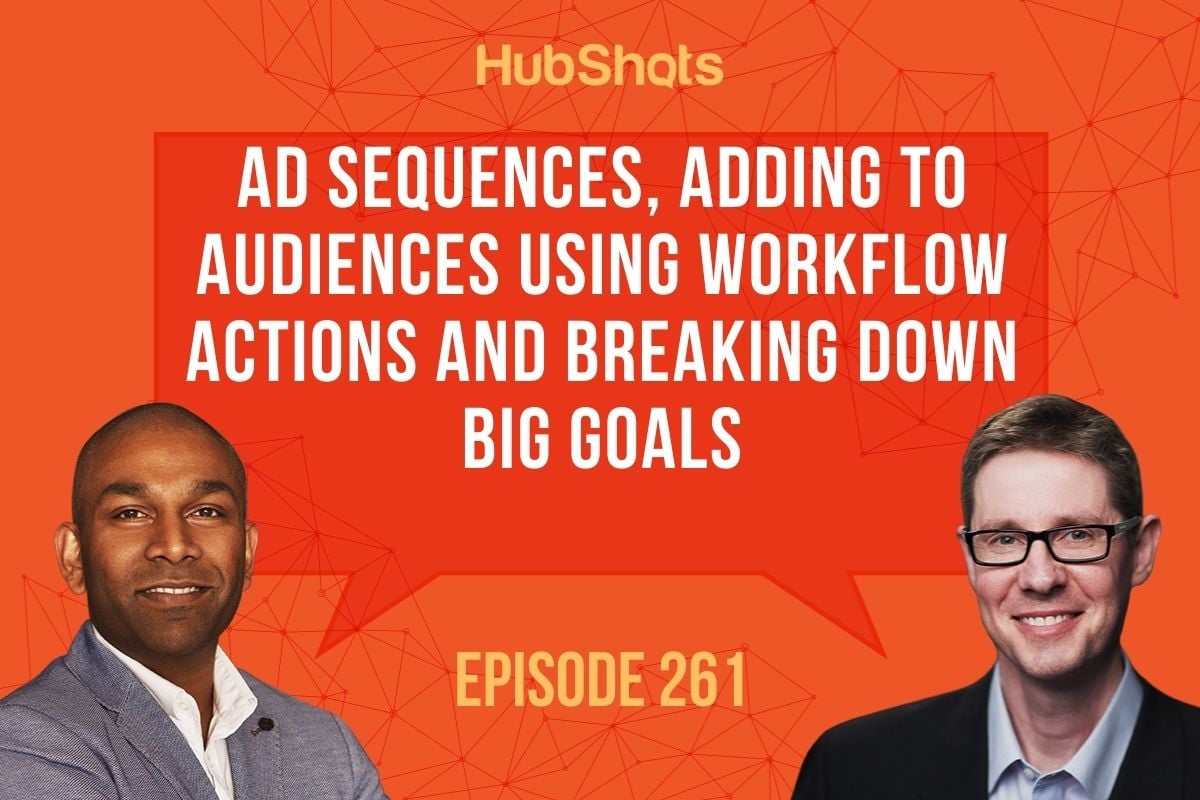
Welcome to HubShots Episode 261: Ad Sequences, Adding to Audiences using Workflow Actions and breaking down big goals This edition we dive into:
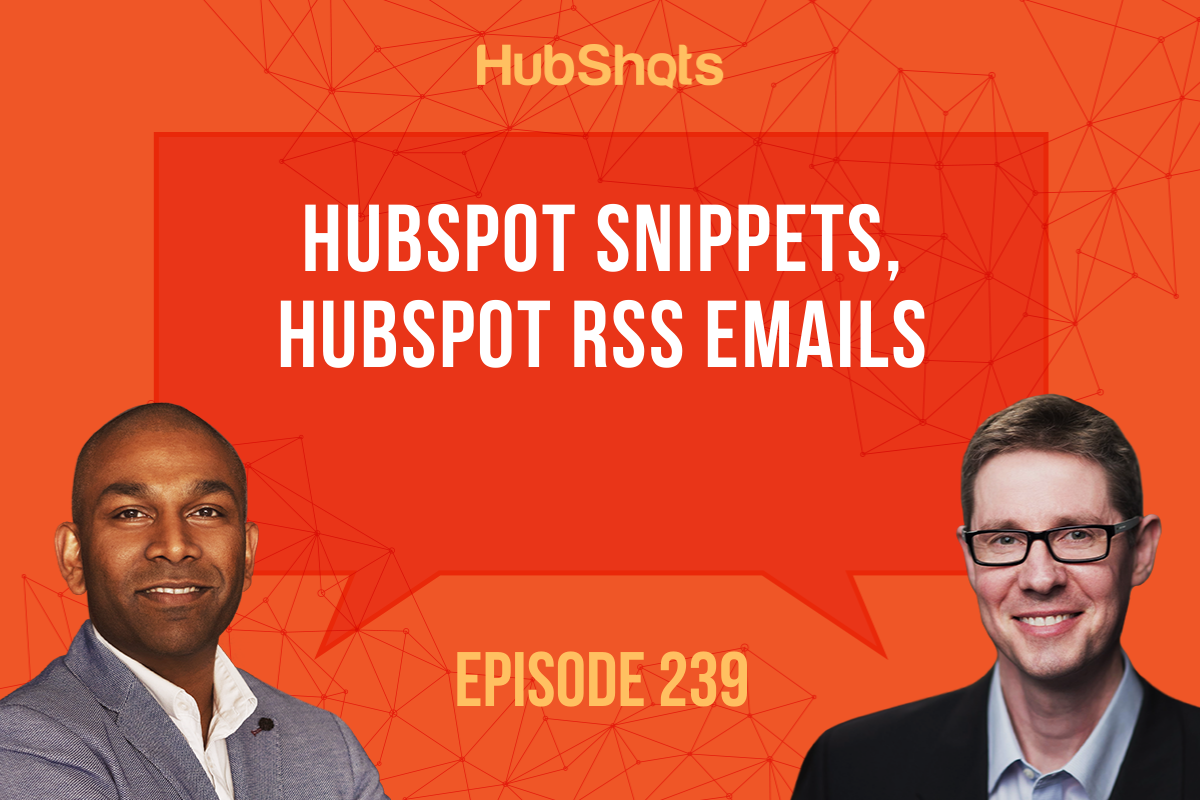
Welcome to HubShots Episode 239: HubSpot Snippets, HubSpot RSS Emails This edition we dive into:
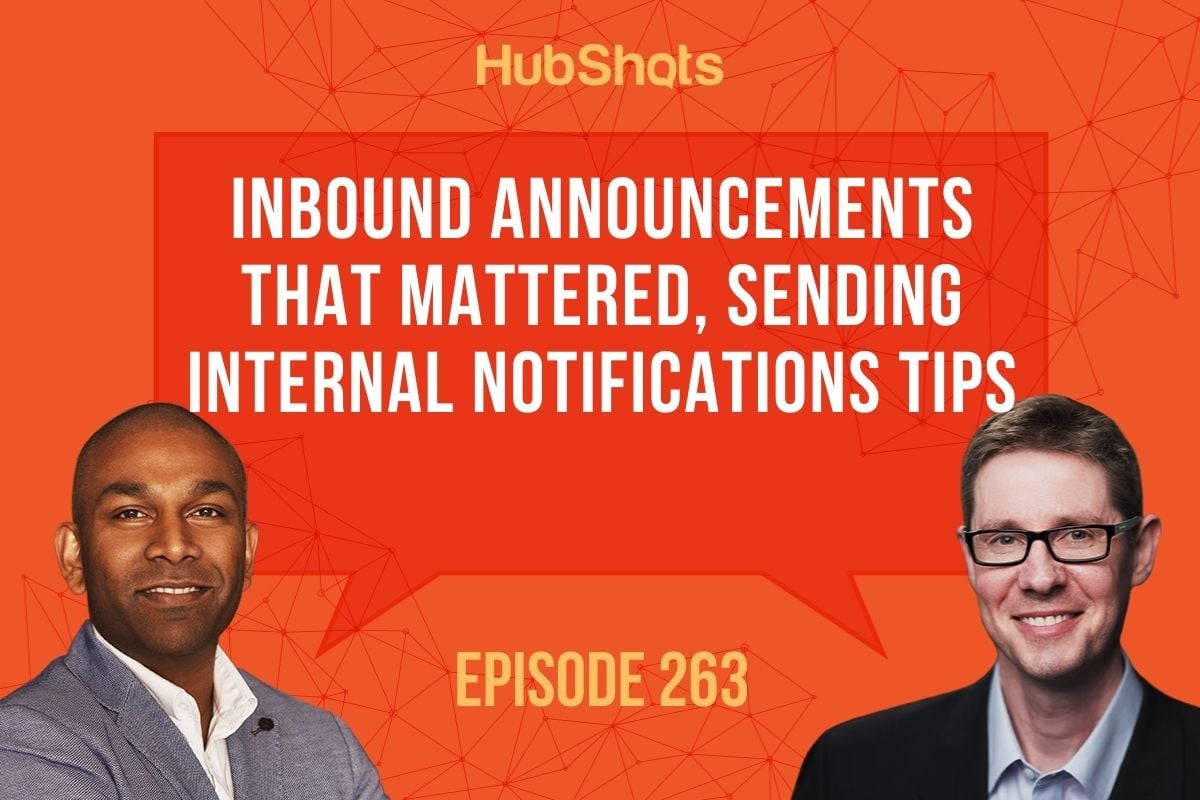
Welcome to HubShots Episode 263: Inbound Announcements that mattered, Sending internal notifications tips This edition we dive into: